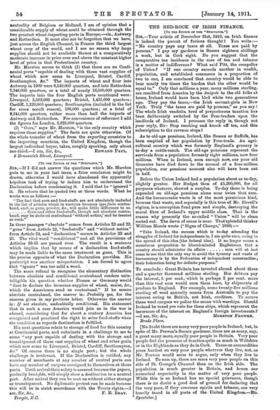rro TNZ EDITOR or THH " SPECTATOR."1
SIR,—If I did not answer the questions which Mr. Marston puts to me in your last issue, a false conclusion might be drawn, otherwise I would have abandoned the apparently hopeless task of trying to induce him to understand the Declaration before condemning it. I said that he " ignored " it. He retorts that he quoted two or three words. What he wrote was as follows :—
" The fact that corn and food-stuffs are not absolutely included in the list of articles which in wartime becomes ipso facto contra- band, such as guns, powder, &c., will make little difference to us. Corn and other food-stuffs, though not absolute contra- band, may be declared contraband `without notice,' and be treated as such."
In these passages "absolute" comes from Articles 22 and 23, "guns" from Article 22, "food-stuffs" and "without notice" from Article 24, and " declaration " occurs in Articles 23 and 25. The vital word " conditional " and all the provisions of Articles 33-35 are passed over. The result is a sentence which implies that by means of a. declaration food-stuffs may be made liable to the same treatment as guns. This is the precise opposite of what the Declaration provides. His postscript was another misquotation. I am forced to agree that " ignore " was too mild a word.
The same refusal to recognise the elementary distinction between absolute and conditional contraband renders unin- telligible his question whether France or Germany would " dare to declare the immense supplies of wheat, maize, &c., which the Americans send us contraband." If he means absolute contraband, the answer is : Probably yes, for the reasons given in my previous letter. Otherwise the answer is : If not absolute, undoubtedly conditional. His statement
that in such a case America would join us in the war is absurd, considering that for about a century America has recognised and practised the right to seize food-stuffs when the condition as regards destination is fulfilled.
His next questions relate to storage of food for this country at Continental ports, and culminate in a challenge to me to name " any port capable of dealing with the storage and transhipment of those vast supplies of wheat and other grain which now come to Liverpool, Bristol, Cardiff, Southampton, &c." Of course there is no single port; but the whole challenge is irrelevant. If the Declaration is ratified, any number of merchants at any number of neutral ports can have any number of cargoes consigned to themselves at those
ports. Until arrival their safety is assured because the papers, perfectly bona fide, will simply show a destination to a neutral
port. After arrival they can be sent on without either storage or transhipment. No diplomatic protest can be made because this will be in strict accordance with the Treaty rights.—I






































 Previous page
Previous page